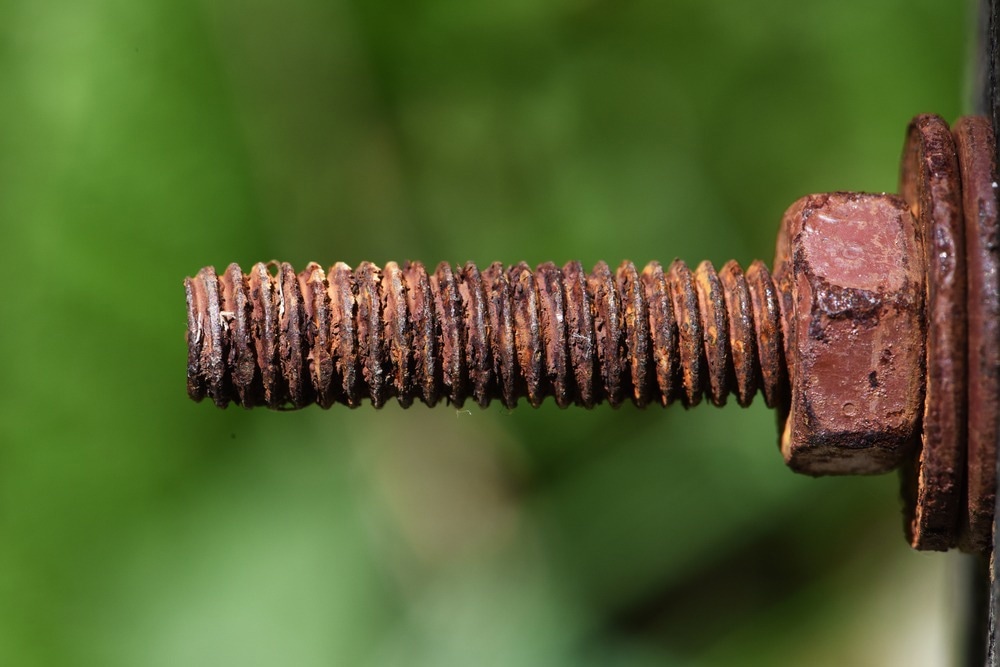A new paper in the journal Sustainability has provided a comparative study and review on sustainable alternatives for corrosion control and prevention applications. The research has been undertaken by scientists from the engineering departments of Prince Mohammad Bin Fahr University and Qassim University in Saudi Arabia.

Study: Development of Sustainable Inhibitors for Corrosion Control. Image Credit: Dr.ing17/Shutterstock.com
Metal Corrosion: A Key Challenge
Metal corrosion and degradation is a critical economic issue that affects worldwide industry, with some estimates putting the international cost of corrosion at around 3% of global GDP in 2013. In the US alone, corrosion is estimated to cost the economy around $500 billion annually.
Metals are used in nearly all industries, being critical infrastructure and engineering materials. Corrosive degradation causes profound changes to material properties and is an unfortunately unavoidable fact of nature. Despite the widespread awareness of the damage corrosion causes, a sizeable proportion of anti-corrosion research has concentrated on remedial strategies rather than preventative material design.
Corrosion occurs in almost all environments, impacting both the performance of systems and components and the aesthetic appeal of materials. In extreme cases, if left unchecked, corrosion can lead to critical system failures and safety issues. It can severely limit the serviceable lifetime of equipment.
![Classification of corrosion inhibitors, Adapted from [15].](https://www.azom.com/images/news/ImageForNews_59708_16596037554115657.png)
Classification of corrosion inhibitors. Image Credit: Khan, M.A.A., et al., Sustainability
The Study
Due to the critical nature of corrosion and the urgent need to develop innovative, proactive solutions to this common environmental phenomenon, the new study in Sustainability aims to provide a timely and comprehensive review of corrosion control and prevention alternatives.
The authors have noted that this is an extremely broad field of research, and therefore the review focuses on current research and advances in sustainable encapsulation and coating methods.
Conventional Corrosion Prevention and Control Strategies
To control corrosion in environments where materials undergo exposure to seawater and chemicals, several strategies are employed. Some strategies use chemical inhibitors that impede corrosion rates, but these are limited by factors such as their own degradation rates and the cost of operation and maintenance. They must achieve a balance between cost and durability.
Mechanical techniques such as spraying the inside of pipes with coatings have been explored in recent years, but their effectiveness can be limited by coating material efficiency. Several techniques such as chemical inhibitors, surface coatings, modified construction materials, and equipment design are used in conjunction to achieve a balance between durability and cost.
![(a) Micrograph of resin (b) Micrograph of resin combined with hardener [35].](https://www.azom.com/images/news/ImageForNews_59708_16596037743055577.png)
(a) Micrograph of resin (b) Micrograph of resin combined with hardener. Image Credit: Khan, M.A.A., et al., Sustainability
Advances in Material Design
Corrosion control requires a complex interplay between material and prevention strategy design. It depends on factors such as protection, environment, humidity, the type of product contained in equipment such as piping, and ecological concerns. Recent advances in materials science have produced materials that are difficult to protect by conventional corrosion prevention techniques.
Currently, prevention strategies are commonly based on post-corrosion processes, which leads to increased complexity and cost of techniques. To improve corrosion prevention for both traditional and advanced materials, a comprehensive approach is needed. Novel processes need to be explored by researchers in the future to mitigate the deleterious effects of corrosion on critical infrastructure and equipment.
Several novel approaches have been developed based on advanced materials science research. These include polymers, nanomaterials, alloys, and biomaterials.
Coatings and Encapsulation Methods
Researching and developing materials with intrinsic anti-corrosion properties, such as superalloys, is an expensive, complex, and lengthy process, and whilst this is an exciting area of research, many studies and companies have focused on anti-corrosion coatings and encapsulation techniques.
Whilst materials such as superalloys display optimal performance, coatings are more economically viable. Several researchers have focused on pH-sensitive synthetic capsules and coatings. These methods are, however, limited due to non-static environmental pH ranges. Furthermore, coatings and capsules are limited by environmental sustainability issues.
Due to environmental concerns, some research has focused on sustainable, biodegradable, and non-toxic materials for use as biodegradable coatings. These include materials based on amino acids such as alanine and cysteine that have displayed adequate corrosion prevention efficiency. Biologically derived materials such as these have the key benefit of availability and renewability.
There are, however, key challenges with biologically derived coatings, such as instability at high temperatures. Encapsulation methods can overcome these issues. Hydrogels, nanoparticles, organic microspheres, and polymeric microspheres have been researched in recent years.
![Photographs of carbon steel after 48 h of dip in NaCl sol. (a) Control material (b) CMC laden carbon steel (c) BTA free sample (d) CMC encapsulated BTA-MS [44].](https://www.azom.com/images/news/ImageForNews_59708_16596037938775144.png)
Photographs of carbon steel after 48 h of dip in NaCl sol. (a) Control material (b) CMC laden carbon steel (c) BTA free sample (d) CMC encapsulated BTA-MS. Image Credit: Khan, M.A.A., et al., Sustainability
The Future
The study has concluded that coating and encapsulation techniques for anti-corrosion applications are a promising area of research in materials science. In particular, amine-based coatings and nanotube-based encapsulation techniques are particularly interesting techniques that, whilst challenging, hold exciting potential for future research.
A future research direction that has been recommended in the study is the comparative analysis of different corrosion inhibitors, such as encapsulation-based, amine-based, and reduced graphene oxide/nanotube-derived variants. This research would greatly benefit future studies. Whilst challenges exist, the opportunities for improving the corrosion resistance and protection of critical equipment and infrastructure are numerous.
Further Reading
Khan, M.A.A., et al. (2022) Development of Sustainable Inhibitors for Corrosion Control Sustainability 14(15) 9502 [online] mdpi.com. Available at: https://www.mdpi.com/2071-1050/14/15/9502
Disclaimer: The views expressed here are those of the author expressed in their private capacity and do not necessarily represent the views of AZoM.com Limited T/A AZoNetwork the owner and operator of this website. This disclaimer forms part of the Terms and conditions of use of this website.